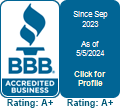If your plumbing system is hooked up to a septic tank instead of a central sewer system, you must give it the maintenance it requires to avoid backups, blockages, drain field floods, and other septic tank problems. Regular septic tank pumping is one of the most important maintenance tasks for your home. Find out what it entails, and how often you should have your septic tank pumped.
What is Septic Tank Pumping? Why is it important?
Modern septic tanks that were built after 1975 usually have two concrete, fiberglass, or polyethylene containers, buried underground. Solid waste tends to accumulate in the first chamber, where it settles at the bottom and forms sludge. A second chamber is also a good place for solids to settle. Although bacteria can break down most of the waste, it cannot eliminate all organic material from a tank.
Septic tank sludge that hasn’t been removed by periodic pumping can build up and overflow into the drain field. This can eventually lead to drain field blockage and eventual failure that will require costly repairs.
Pumping septic tanks involves the removal of liquids and solids using a vacuum truck. The vacuum truck transports and safely disposes of the sludge. It should not be difficult for the vacuum truck to remove the solids from your tank as long as you maintain routine maintenance. Pumping may become more expensive if the container’s sludge is too thick or heavy.
It’s important to keep up with septic tank pumps for your safety and your plumbing system’s continued functionality.
How Often Should Your Tank Be Pumped?
It is recommended that your septic tank be pumped at least once every three to five years. These are some common reasons why you should have your septic tank pumped more often:
- Your home may be shared by several people who produce large amounts of wastewater.
- Your septic tank has a smaller storage capacity and is, therefore, less efficient.
- A garbage disposal sends solids to the septic tank.
- A water softener is used to drain the water from the septic tanks.
- Wash your laundry often.
These tips can help you reduce the frequency of having your septic tank pumped.
- Install low-flow toilets, faucets, and showerheads.
- A high-efficiency, water-conserving washing machine is recommended.
- Do not load up on dishes and clothes.
- As soon as possible, repair plumbing leaks such as a leaking faucet or running toilet.
- Avoid using harsh cleaners, and don’t use antibacterial products to kill important microorganisms.
Signs That You Need Emergency Pumping
One of the most obvious signs of a septic system emergency is a flooded drain field. But, If you see standing water in your drain field, don’t pump the septic tank. Until the flood is over. The tank may float in the water and cause damage to pipes. To prevent flooding, keep people from the area and call an emergency plumber.
You can avoid drain field flooding by being aware of signs that your tank is full. You should immediately schedule emergency septic tank pumping if you notice any of these signs.
- Slow drains
- The pipes make gurgling sounds
- Water in the basement
- After heavy rain, foul odors can be detected in the drain field
Get Your Septic Tank Pumped
Call Clog Kings LLC if you feel it is time to have your pumping scheduled or if you are experiencing problems with the septic tank. We are available 24 hours a day to help with septic tank emergencies.


